Catholic Church

As the 117 Roman Catholic cardinals walk into the Sistine Chapel next month for the election of a new pope, one hopes that they fully recognize the unfolding, dramatic pilgrimage of world Christianity: The demographic center of Christian faith has moved decisively to the Global South.
Over the past century, this astonishing demographic shift is the most dramatic geographical change that has happened in 2,000 years of Christian history. Trends in the Catholic Church — comprising about 1 out of 2 Christians in the world — have generally followed this global pattern:
- In 1900, about 2 million of the world’s Catholic faithful lived in Africa; by 2010, this had grown to 177 million.
- 11 million Catholics were found in Asia in 1900; by 2010 there were 137 million Asian Catholics.
- Through colonial expansion, 59 million Catholics populated Latin America and the Caribbean in 1900; but by 2010, that number had grown to 483 million.
- In 1900, two-thirds of the world’s Catholic believers were in Europe and North America; today, two-thirds are in Latin America, Africa, and Asia.
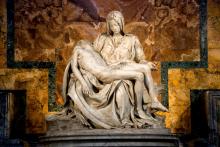
For the first time in six centuries, the head of the Catholic Church is stepping down. Some, like Huffington Post Religion’s Senior Editor Paul Raushenbush, have suggested this is an indication that the stodgy religious institution is creeping its way toward modernism. Could it be that the role of Pope will be considered to be that more like a CEO than a sovereign ruler? Is there room within today’s church for its leadership to step down when they feel they can no longer adequately fill the tremendous demands heaped upon them?
Can Popes retire? And if so, do they have to give up those cool red shoes?
So if, indeed, the Catholic Church is moving in a new direction, why not consider a more thorough overhaul? Some have suggested that the next Pope should come from the southern hemisphere, given that this is where the faith is growing the most (actually, it’s not really growing much at all in the northern half of the world). But as some have suggested within the church, the process of selecting a Pope is not necessarily driven by creating a representative leadership.
That said, it seems a rare opportunity to do something exciting. I, like many people, assumed that the successor to Pope Benedict would have to come from within the College of Cardinals. But though this has been tradition for most of the life of the Church, Pope Clement V is a rare exception. He was plucked from a monastery to become Pope, with the hope of overcoming much of the perceived corruption within the College.
And though the College of Cardinals is not explicitly mired in scandal at the moment, the Church itself certainly has suffered some blows in the court of public opinion, as well as in the court of law, in some cases. So given that precedent, perhaps it’s time for another radical departure from tradition, one that will signal to the world that the Church is more committed than ever before to its mandate to care for the poor, and support the marginalized.
Not all Catholics appreciated Pope Benedict XVI’s staunch defense of Christian orthodoxy, traditional marriage, and life from conception to natural death. But American evangelicals sure did.
As word spread on Monday of Benedict’s resignation, many evangelicals lamented the impending loss of a powerful spokesman for their conservative causes.
“Pope Benedict XVI has exemplified moral courage and an unwavering commitment to the Gospel message,” said Ralph Reed, chairman of the Faith & Freedom Coalition, a conservative Christian political group.
“We honor him for his lifelong service to the Lord and his inestimable intellectual contribution to Christian orthodoxy.”
The high praise — “evangelical Benedictions,” you might say — extended beyond U.S. borders as well.
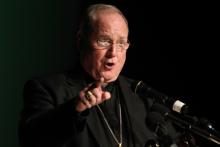
NEW YORK — Walk the streets of Manhattan, especially around St. Patrick’s Cathedral, and ask passersby about Cardinal Timothy Dolan and two things stand out: one, they know who you’re talking about, and two, they like him. Often love him.
Both responses are unusual in the U.S. today: generally, Catholic churchmen are either interchangeable faces to the public, or, if they are known, it’s because of an unflattering headline.
Now Dolan’s extraordinary visibility and popularity are being cited as factors that could make him the first American with a realistic shot at being elected pope when the College of Cardinals gathers in March to elect a successor to Benedict XVI.
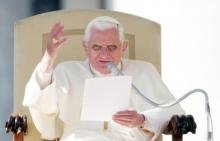
Pope Benedict XVI came into office with the reputation of a conservative hardliner, a vigorous defender of orthodoxy who wanted to restore Tradition — yes, with a capital “T” — to a church that was seen as disturbingly undisciplined.
Yet with the stunning announcement that he is resigning as the 264th successor to Saint Peter, Benedict may wind up fundamentally changing the way the church and the world view the papacy.
That’s because the papacy has come to represent more than an office, and the pope more than just a higher-ranking priest or bishop who enjoys lifetime tenure, a nice Vatican apartment, and the privilege of wearing a white cassock no matter the season.
Instead, the papacy is seen as a divine mission unlike any other in the church, and one that ends only in death.
“Christ did not come down from the cross,” the late John Paul II, Benedict’s immediate predecessor, would tell aides who wondered if his failing health and public suffering should compel him to relinquish his office.
A man is elected pope by the cardinals, yes, but at the behest of the Holy Spirit, according to Catholic theology. He takes a new name, and can’t even go home to collect his things: He moves into the Vatican right away, inhabiting a new identity in a new position — so superior that canon law says a pope can resign, but says he cannot resign to anyone.
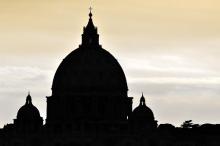
Pope Benedict XVI’s sudden announcement that he would resign by the end of the month took the church and the world by surprise, in large part because it was a move without precedent in the modern world.
But what comes next is as old and familiar as the papacy itself: Speculating about who will succeed to the Throne of St. Peter.
Indeed, within months of Benedict’s own election in 2005, church insiders and online oddsmakers were trying to figure out who might be next, given that Benedict — now 85 — was already aging, increasingly frail, and had himself declared that he did not expect his reign to be a long one.
So what will happen when the world’s cardinals gather before the splendor of Michelangelo’s Last Judgment fresco in the Sistine Chapel to elect a new pope? Who are the “papabile,” as the Italians say, the “pope-able” cardinals?
Will the conclave make the epochal break with the European monopoly and pick a cardinal from Latin America or Africa? The Catholic Church is booming in the Southern Hemisphere, as opposed to Europe and North America, where it is on life-support or barely treading water.
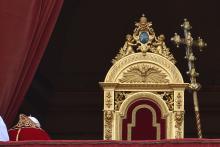
After nearly eight years since being named to the chair of Peter, Pope Benedict XVI announced this morning that he is resigning at the end of February.
" ... in today’s world, subject to so many rapid changes and shaken by questions of deep relevance for the life of faith, in order to govern the bark of Saint Peter and proclaim the Gospel, both strength of mind and body are necessary, strength which in the last few months, has deteriorated in me to the extent that I have had to recognize my incapacity to adequately fulfill the ministry entrusted to me. For this reason, and well aware of the seriousness of this act, with full freedom I declare that I renounce the ministry of Bishop of Rome, Successor of Saint Peter, entrusted to me by the Cardinals on 19 April 2005, in such a way, that as from 28 February 2013, at 20:00 hours, the See of Rome, the See of Saint Peter, will be vacant and a Conclave to elect the new Supreme Pontiff will have to be convoked by those whose competence it is."
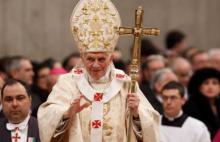
VATICAN CITY — In a move that took the world by surprise, Pope Benedict XVI announced on Monday that he will become the first pope in 600 years to resign, with plans to step down on Feb. 28.
“After having repeatedly examined my conscience before God, I have come to the certainty that my strengths, due to an advanced age, are no longer suited to an adequate exercise of the Petrine ministry,” Benedict told cardinals as they gathered in Rome for the proclamation of new saints.
Vatican spokesman Rev. Federico Lombardi said preparations for the conclave that will elect Benedict’s successor are in the early stages.
A papal election could be expected “within 10 to 15 days,” he said. “We should have a new pope by Easter.”
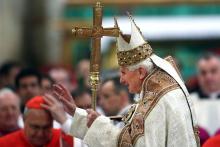
Pope Benedict XVI announced today he will step down on Feb. 28, citing his advanced age. The head of the Catholic Church is 85 years old. Below is the text of his announcement.
Dear Brothers,
I have convoked you to this Consistory, not only for the three canonizations, but also to communicate to you a decision of great importance for the life of the Church. After having repeatedly examined my conscience before God, I have come to the certainty that my strengths, due to an advanced age, are no longer suited to an adequate exercise of the Petrine ministry. I am well aware that this ministry, due to its essential spiritual nature, must be carried out not only with words and deeds, but no less with prayer and suffering. However, in today's world, subject to so many rapid changes and shaken by questions of deep relevance for the life of faith, in order to govern the bark of Saint Peter and proclaim the Gospel, both strength of mind and body are necessary, strength which in the last few months, has deteriorated in me to the extent that I have had to recognize my incapacity to adequately fulfill the ministry entrusted to me. For this reason, and well aware of the seriousness of this act, with full freedom I declare that I renounce the ministry of Bishop of Rome, Successor of Saint Peter, entrusted to me by the Cardinals on 19 April 2005, in such a way, that as from 28 February 2013, at 20:00 hours, the See of Rome, the See of Saint Peter, will be vacant and a Conclave to elect the new Supreme Pontiff will have to be convoked by those whose competence it is.
Dear Brothers, I thank you most sincerely for all the love and work with which you have supported me in my ministry and I ask pardon for all my defects. And now, let us entrust the Holy Church to the care of Our Supreme Pastor, Our Lord Jesus Christ, and implore his holy Mother Mary, so that she may assist the Cardinal Fathers with her maternal solicitude, in electing a new Supreme Pontiff. With regard to myself, I wish to also devotedly serve the Holy Church of God in the future through a life dedicated to prayer.
Since Vatican II American Nuns have worked to fill in the gaps of the American health care system. A new documentary chronicles how these nuns changed the Catholic Church's social justice movement. CNN reports:
"Vatican II was the spark that showed the church isn't just the hierarchy, it's the people," Fishman said. "Sisters from all over the country were inspired to work directly with those that needed their help. These faith-filled people became the most vibrant part of the church who went on to get people excited and passionate about doing God's work and creating real change."
Read more here.

VATICAN CITY — Exactly 500 years ago, on Oct. 31, 1512, Pope Julius II led an evening prayer service to inaugurate the Sistine Chapel and Michelangelo's newly-finished vault frescoes.
But as Pope Benedict XVI on Wednesday celebrated the 500th anniversary of the Renaissance masterpiece, the Vatican said the growing number of tourists who visit the historic site every year might eventually lead to limiting access to the chapel to help preserve the frescoes from human-born problems and pollutants.
“We could limit access, introducing a maximum number of entries,” wrote Antonio Paolucci, the director of the Vatican Museums, in L'Osservatore Romano, the Vatican's semi-official newspaper. “We will do this, if the pressure from tourism were to increase beyond a reasonable level and if we were to fail in resolving the problem efficiently.”
Paolucci stressed, however, that in his opinion such measures will not be necessary “in the short to medium term.”

About 30 people are gathered in a dark, makeshift sanctuary at St. Anthony of Padua Church as the sun dips into the horizon. The service follows the familiar pattern of a Catholic Mass, but something is different: The worshippers are dressed casually, many in jeans, and the priest speaks directly and informally to his parishioners. Even the words of the liturgy seem slightly off.
This isn’t a typical Roman Catholic Mass. The church is barely a year old, and it’s part of a new independent Catholic movement, the American National Catholic Church, and bills itself as a home for "Contemporary Catholics."
Founded in 2009 by a bishop and a group of priests seeking a more inclusive religious experience but not ready to leave the Catholic tradition completely, the ANCC aims to follow the spirit of reform established by the Second Vatican Council (1962-1965).
While the sacraments and many fundamental beliefs remain identical to those of Roman Catholicism, the ANCC presents a more progressive version of Catholicism: divorced members can take Communion, women and gays can be ordained, and priests can marry.
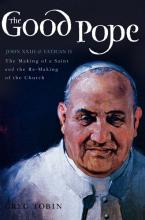
Fifty years after Pope John XXIII convened the Second Vatican Council that revolutionized the Catholic Church, will the jolly man known as the "Good Pope" be declared a saint of the Roman Catholic Church? Perhaps the better question is: Should he be?
On the evening of June 3, 1963, John XXIII passed into eternity with his family, doctors and household staff present in the papal apartments where he had lived for four and a half years. The Vatican press office issued this terse statement: “He suffers no more.”
Immediately, there was a movement by some close to the deceased pope to have him canonized by acclamation, as saints had been during the early centuries of the church. The first session of the Second Vatican Council (1962-65) had ended in December 1962, and the pope had published his landmark encyclical letter,Pacem in Terris (Peace on Earth) in April 1963.

An Illinois priest who was forced out of his parish by his bishop for improvising prayers during Mass has had his suspension reversed by the Vatican.
The Vatican decided in favor of the Rev. William Rowe on one of three counts, saying Bishop Edward Braxton of Belleville, Ill., had not followed the proper procedure.
The Vatican's reversal means he can celebrate Mass in another diocese, Rowe said, as long as he has the local bishop's approval. Others, however, disputed that interpretation of the decree.
In a letter that accompanied the document, Monsignor Antonio Neri, an undersecretary of the Vatican's Congregation for the Clergy, said Rowe could only return to celebrating Mass “when you shall have acknowledged your error and formally promise to dispose yourself to adhere to the rights and rubrics of the sacred liturgy set down by the lawful ecclesiastical authorities.”
The Vatican sided with the bishop on two counts: upholding his removal from the parish, and agreeing with the bishop's withdrawal of the priest's "faculties" — or his license to practice ministry under church law.
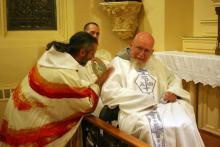
The Rev. Benedict Groeschel, a well-known Catholic author and television personality, has given up his longtime spot on the conservative cable network EWTN following comments in which he appeared to defend clergy who abuse children while blaming some victims.
“Father Benedict has led a life of tremendous compassion and service to others and his spiritual insights have been a great gift to the EWTN family for many years. We are profoundly grateful to him and assure him of our prayers,” Michael P. Warsaw, head of EWTN Global Catholic Network said in announcing Groeschel’s decision to step down.
In his statement on Monday Warsaw also asked EWTN viewers “to pray for all those who have been affected by this painful situation and in particular those who have been victims of sexual abuse.”
The U.S. Catholic bishops' point man on sexual abuse has said that the hierarchy's credibility on fixing the problem is "shredded" and that the situation is comparable to the Reformation, when “the episcopacy, the regular clergy, even the papacy were discredited.”
Bishop R. Daniel Conlon of Joliet, Ill., last month told a conference of staffers who oversee child safety programs in American dioceses that he had always assumed that consistently implementing the bishops’ policies on child protection, “coupled with some decent publicity, would turn public opinion around.”

The Rev. Benedict Groeschel, whose comments defending priests who sexually abuse children sparked a firestorm of controversy (see related story here), on Thursday evening apologized for the remarks. Groeschel had said that priests who sexually abuse children "on their first offense" should not go to jail and added that in “a lot of cases,” the child is “the seducer.”
The religious community he founded, the Franciscan Friars of the Renewal, based in New York, also denounced the comments. The statements followed a wave of condemnation that grew in the days since the interview with Groeschel was first published.
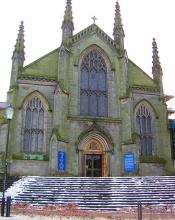
The Roman Catholic Church has sent a letter to its parishes across Scotland protesting a political race to legalize same-sex marriage.
The letter was read Sunday (Aug. 26) by priests in 500 Catholic parishes urging Scotland's political leaders to "sustain rather than subvert marriage" and to reaffirm that "marriage is a unique, lifelong union between a man and a woman."
Scotland is caught up in a debate over whether it should become the first segment of Britain to legalize gay marriage, ahead of England and Wales.
After the letter was read out in churches Sunday, the Scottish government insisted that it intends to legalize same-sex marriages and religious ceremonies for civil partnerships because "it is the right thing to do."
The issue is still in the consultation stage in England and Wales.
Interethnic violence has flashed through India during the conclusion of the Muslim holy season of Ramadan during which Muslims fast from sunrise to sunset. Catholic leaders in northern India, where Muslim migrants have been particularly targeted, has called for common ground dialogue and hosted meetings with leaders of the conflicted communities based on the Catholic churches long-standing relationships with both communities.
Anto Akkara for ENI NEWS reports:
"Churches are initiating steps to broker peace and restore harmony in the northeast Indian state of Assam, which has been rocked by bloody clashes between local ethnic Bodo people and Muslim migrants.
'We have hosted leaders of both communities twice already. We are now preparing a larger meeting of both communities after Ramadan,"'Roman Catholic bishop Thomas Pulloppillil of Bongaigaon diocese that comprises the troubled region, told ENInews on 15 August 2012.
The clashses have left 78 dead and over 400,000 refugees."
Read the rest of the article here.
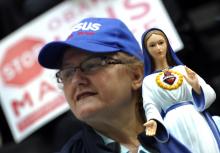
The Obama administration’s policy requiring most employers to provide free birth control coverage in their health insurance policies takes effect on Aug. 1 — a deadline that has sparked apocalyptic warnings from conservative activists and some faith groups.
“August 1st is a day that will live in infamy for the First Amendment and the fundamental freedoms and rights we as a people have enjoyed since the founding of our nation,” said Brent Bozell, head of ForAmerica. “With the stroke of a pen, the Obama Administration has shredded the First Amendment and the Constitution right before our eyes.”
“August 1st will be remembered as the day our most cherished liberty was thrown in a government dumpster and hauled away,” echoed Matt Smith, head of Catholic Advocate. And that’s just a sampling of the outrage.
Are the claims legitimate? As with most federal regulations, it’s complicated, and the supercharged politics of the issue, in the midst of a presidential campaign, don’t help.
Moreover, religious freedom is by its nature a topic that prompts heated debates — without always providing a clear answer.